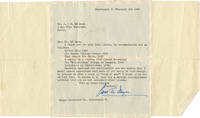Archive of four letters discussing a sound version of The Passion of Joan of Arc by Dreyer, Carl Theodore; Joseph-Marie Lo Duca - 1949
by Dreyer, Carl Theodore; Joseph-Marie Lo Duca

Archive of four letters discussing a sound version of The Passion of Joan of Arc
by Dreyer, Carl Theodore; Joseph-Marie Lo Duca
- Used
- Signed
N.p.: N.p., 1949. Archive of four letters between Carl Theodore Dreyer and film historian and eventual "Cahiers du Cinema" co-founder Joseph-Marie Lo Duca primarily regarding Lo Duca's proposed sound-added release of Dreyer's 1927 silent masterpiece "The Passion of Joan of Arc," and the French release of Dreyer's 1943 film "Day of Wrath."
Included in the archive are carbon typescripts of one typed letter unsigned and one typed letter signed from Lo Duca to Dreyer, with text in French, and dated August 3, 1944 and May 15, 1946 respectively, along with two typed letters signed from Dreyer to Do Luca, with text in English, dated May 21, 1946 and February 4, 1949 respectively.
In the first letter, Lo Duca thanks Dreyer for his permission to present a new subtitled and soundtracked version of "Joan of Arc" and mentions that he is looking for a print of the film. (A fire had destroyed Dreyer's original cut of the film in 1927, and a second fire, in 1929, destroyed most of the extant copies of his recut version.) In the second letter, Lo Duca tells Dreyer that he has found a suitable print, but is unable to find a donor for the project without Dreyer's express permission, referencing an attached contract, which is not included in the archive.
Dreyer's response details some of his objections to Lo Duca's project, stating he believes it "is a great, great mistake to try to transform 'Joan of Arc' into a talkie" because the film was conceived and shot to be silent, and by "[taking] away the printed titles there will be some terrible gaps whose effect will be tremendous."
In the final letter, dated three years later, and after what must have been additional and ongoing negotiations between the two, Dreyer acquiesces and gives Lo Duca "the authorization you are asking for" to provide a musical soundtrack for the film "provided that you do not introduce other sounds." He also compliments Lo Duca on his choice of Bach for the film and asks he be sent a print of the finished version.
Lo Duca's cut of the film, which featured Baroque music, new intertitles decorated with images of stained glass and church pews, and cut off the left edge of the image to accommodate the soundtrack, was released in 1951. Dreyer was apparently displeased with the work, but for many years it remained the only version available, helping to preserve interest in what has generally come to be regarded as the greatest film of the silent era.
Three of the letters with light dampstaining to the bottom and right edge, else Near Fine overall.
Translation available on request.
Included in the archive are carbon typescripts of one typed letter unsigned and one typed letter signed from Lo Duca to Dreyer, with text in French, and dated August 3, 1944 and May 15, 1946 respectively, along with two typed letters signed from Dreyer to Do Luca, with text in English, dated May 21, 1946 and February 4, 1949 respectively.
In the first letter, Lo Duca thanks Dreyer for his permission to present a new subtitled and soundtracked version of "Joan of Arc" and mentions that he is looking for a print of the film. (A fire had destroyed Dreyer's original cut of the film in 1927, and a second fire, in 1929, destroyed most of the extant copies of his recut version.) In the second letter, Lo Duca tells Dreyer that he has found a suitable print, but is unable to find a donor for the project without Dreyer's express permission, referencing an attached contract, which is not included in the archive.
Dreyer's response details some of his objections to Lo Duca's project, stating he believes it "is a great, great mistake to try to transform 'Joan of Arc' into a talkie" because the film was conceived and shot to be silent, and by "[taking] away the printed titles there will be some terrible gaps whose effect will be tremendous."
In the final letter, dated three years later, and after what must have been additional and ongoing negotiations between the two, Dreyer acquiesces and gives Lo Duca "the authorization you are asking for" to provide a musical soundtrack for the film "provided that you do not introduce other sounds." He also compliments Lo Duca on his choice of Bach for the film and asks he be sent a print of the finished version.
Lo Duca's cut of the film, which featured Baroque music, new intertitles decorated with images of stained glass and church pews, and cut off the left edge of the image to accommodate the soundtrack, was released in 1951. Dreyer was apparently displeased with the work, but for many years it remained the only version available, helping to preserve interest in what has generally come to be regarded as the greatest film of the silent era.
Three of the letters with light dampstaining to the bottom and right edge, else Near Fine overall.
Translation available on request.
-
Seller
Royal Books, Inc.
(US)
- Book Condition Used
- Quantity Available 1
- Publisher N.p.
- Place of Publication N.p.
- Date Published 1949
- Keywords Letters | Film Ephemera | Silent Film | 1920s Cinema